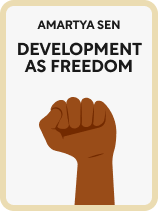

This article is an excerpt from the Shortform book guide to "Development as Freedom" by Amartya Sen. Shortform has the world's best summaries and analyses of books you should be reading.
Like this article? Sign up for a free trial here .
What are the challenges of democracy? Why does democracy make it harder to exercise a freedom-based approach to economic development?
According to Amartya Sen in Development as Freedom, one of the ways to approach poverty as a social problem is to implement democracy and capitalism. However, he does understand that the few challenges of democracy can get in the way of that.
Read more to understand the challenges of democracy and why Sen is still hopeful we can overcome them to create stable economies.
Challenges of Democracy
Sen views income-centered development as inadequate because it overlooks aspects of welfare that people value. Instead, free markets and democracy are integral to Sen’s theory of development because they afford basic freedoms and spur economic growth. Yet, Sen does acknowledge that his freedom-centered approach presents several problems due to the nature of democracy and capitalism. What are the challenges of democracy that people will face?
- The difficulty of consensus: Because of the varied preferences and priorities of factions in a democracy, it’s hard to reach agreements on public policy.
- Unintended consequences: Governments often adopt well-intentioned policies that result in more harm than good.
- Issues of self-Interest: The profit motive can encourage behavior at odds with the public interest.
We’ll discuss each criticism in detail.
1. Difficulty of Consensus
Sen advocates a coherent, strategic approach to social policy. However, a primary challenge is that, in a democracy, one approach isn’t feasible because people have so many different values and preferences.
Because of this variety, they contend that devising a single socially just framework will necessarily violate some people’s versions of justice.
Sen makes two counterarguments:
- Democracy requires some compromise. Sen says that partial agreements achieved through the democratic process are still valuable and can greatly advance progress.
More social interaction leads to better results. Empowering more people to engage in public discussion fosters new values and preferences, which can improve all of society.
2. Unintended Consequences of Public Policy
Some critics also oppose Sen’s advocacy of a government role in crafting social policy because a difficult challenge to overcome in a democracy is governments’ attempts are often counter-productive.
Many policies that tried to help people directly have backfired. As noted earlier, China’s “one-child policy” was supposed to address the problem of overpopulation by reducing fertility rates. In practice, however, it led to increased mortality rates for women and girls, sex-selective abortion, and an imbalance in the ratio of males to females. Despite these criticisms, Sen believes policymakers can craft policies that work as intended. Sen cites a national focus on literacy and health care systems that have worked in many East Asian countries, as well as programs to eradicate infectious diseases.
Sen makes a distinction between unintended consequences and predictable consequences. While many policies may have unintended results, if these results are predictable, they can guide policymakers in the right direction. For example, while governments can’t determine the exact benefits of investing in health care, they can determine more generally that the benefits are usually worth the investment.
3. Self-Interest and Capitalist Values
The third challenge to Sen’s approach is balancing self-interest with collective interests in a democracy. Sen explains how the pursuit of individual interests can promote economic development.
The Benefits of Self-Interest
In market economies, Sen says most people, whether producers or consumers, seek to satisfy their desires. However, this pursuit of personal gain often leads to unintended positive results for the economy, because the interests of producers and consumers are often complementary.
The Butcher, the Brewer, and the Baker
Sen invokes Adam Smith’s famous “butcher, brewer, and baker” example. All three provide their services to customers out of their personal desire to make a profit, not as an act of charity. Yet, when a customer decides to buy a product, the customer becomes better off, as do the producers. It’s this process of mutual benefit that drives economic progress in the capitalist system.

———End of Preview———
Like what you just read? Read the rest of the world's best book summary and analysis of Amartya Sen's "Development as Freedom" at Shortform .
Here's what you'll find in our full Development as Freedom summary :
- The five types of freedom that are integral to economic development
- How democracy can prevent famine
- How empowering women helps communities






